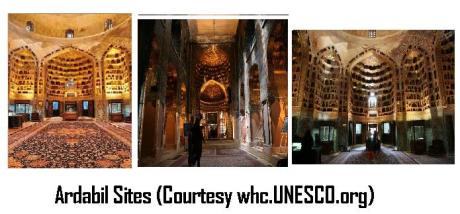
The United Nations Educational, Scientific and Cultural Organization (UNESCO) World Heritage Committee selected the Tabriz Historical Bazaar Complex and Ardabil’s’ Shiekh Safi al-Din Khanegah and Shrine Ensemble as World Heritage Sites at its 34th (July 25-August 4) meeting in Brazil. Both sites are in the northwest region of Iran’s Azerbaijan. ADAPP news made the announcement earlier today.
The selection process started in 2008 and with UNESCO’s welcome decision, Iranians everywhere can celebrate what they have always known: world significance in all things cultural, scientific, and educational.
Of more significance is an apparent avowal by current Iranian leadership of Azerbaijani influence on Iran’s cultural, economical, and socio-political heritage. Ask most Azerbaijanis (in Iran or the Diaspora) and they’ll tell of the significant contributions their ethnic group has made to Iran long before the country embraced the name. One would assume that such an important ethnic group would enjoy its flourishing history in the land that has been their home for centuries. A logical assumption, but reality often seems to contradict assumptions, no matter how basic.
Azerbaijanis can’t even speak their native language in schools, as all education and Iranian quotidian are in Persian/Farsi. Azerbaijanis suffer racism and prejudice just because of their heritage. Consider “Iran’s finest living poet” Dr. Reza Baraheni—who was forced to link the ink of the paper on which he had written his native Azeri-Turkic—shared about the plight of Azerbaijanis in Iran:
“Little is more traumatic than the suppression of one’s mother tongue. … Racial or ethnic suppression of the mother tongue can never be total, because you use it with your family, and friends. But the dominant language and its culture (in my case Persian) are imposed on you, supplanting your mother tongue and culture (mine is Azeri, a Turkic language), labeling it the language and culture of traitors.”[i]
If the language and culture of Azerbaijanis are treacherous, then the same should be for the contributions, i.e. the UNESCO’s World Heritage Sites. Of course, that won’t happen. Nevertheless, one hopes that as these sites have been accorded world respect, the Azerbaijani people of Iran will soon get world attention and equal rights in their home country. The international community should feel compelled to speak out against this suppression and help the Iran’s leadership understand the futility of suppressing minority rights.
Congratulations to the Iranian Azerbaijanis and Congrats to the nation of Iran!
[i] Asgharzadeh, Alireza. 2007. Iran and the Challenge of Diversity. New York: Palgrave/Macmillan. P.157.
Baraheni, Reza. 1998. “The Poet as Prisoner: Language and Creative Imagination in Exile.” In Reflections Summer:21-24, p. 22






